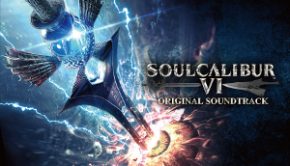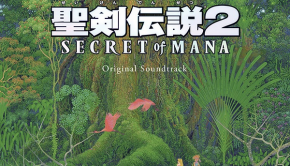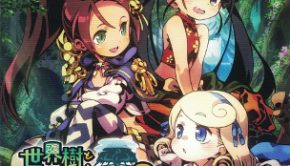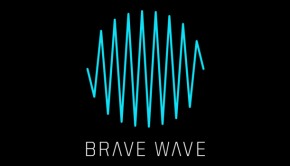The Legend of Heroes -Zero no Kiseki Evolution- Original Soundtrack
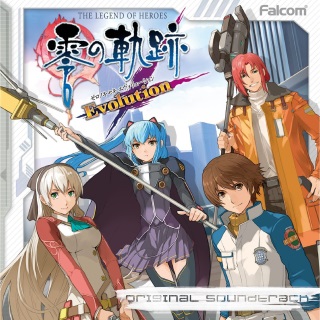 |
Album Title: The Legend of Heroes -Zero no Kiseki Evolution- Original Soundtrack |
| Record Label: Falcom |
|
| Catalog No.: NW10103190 |
|
| Release Date: November 30, 2012 |
|
| Purchase: Buy at CDJapan |
Overview
The Legend of Heroes series had always been very elusive to the Western gaming community. The Gargharv trilogy, while well received in Japan, was plagued by translation problems when it was brought over to the West by Namco Bandai. The Sora no Kiseki trilogy, which brought the series to the forefront of the JRPG community in Japan, faced huge hurdle in its localisation due to the sheer amount of text contained in the game. So far the English gamers had only received the First Chapter of the Sora no Kiseki trilogy while Falcom had already released four more titles for the series in Japan.
But that is about to change as Xseed recently announced that they will be bringing Sen no Kiseki and its sequel to the West, in addition to the soon to be released Second Chapter of Sora no Kiseki. Regardless, this review will focus the soundtrack for the first game of the duology between the Sora no Kiseki and Sen no Kiseki: Zero no Kiseki, which will be followed by Ao no Kiseki. However, the reviewed soundtrack is not of the original game on the PSP, but an upgraded port titled Zero no Kiseki Evolution for the PS Vita with completely rearranged music. This review will not compare the upgraded music with the original but will instead focus on the The Legend of Heroes Zero no Kiseki Evolution Original Soundtrack on its own merit.
Body
The music crafted for the Legend of Heroes series by Falcom Sound Team JDK has always been very melodious, and Zero no Kiseki is no exception. Almost all the pieces in this soundtrack have a memorable melody that one can hum along after listening to them. While all the music in the Zero no Kiseki Evolution Original Soundtrack is originally composed by Falcom Sound Team JDK, Yukihiro Jindo is the only members from the team involved in arranging for the PSV port. The other arrangers are Noriyuki Kamikura, Wataru Sato, N.G.Fellowship, and Ryo Noguchi. The higher sound production values and the use of live instruments in the Evolution soundtrack imbued new lives into the tracks.
Opening the first of the three discs soundtrack, “way of life -ZERO NO KISEKI Evolution opening version-“ is your typical sweeping J-pop song sung by Kanako Kotera, who had been singing the theme song for every game in the Legend of Heroes series since Sora no Kiseki FC. The full version of the song can be heard at the end of disc 3.
The first disc of the soundtrack showcased the most frequently heard pieces in the game, including town music and battle themes. The main location where the protagonists of Zero no Kiseki are based at is a state city known as Crossbell. The varied musical style that the Falcom team is capable of composing in is evident from the pieces used for the various sections within the Crossbell city alone, such as “Scene of a Street Corner”, “C.S.P.D -Crossbell Police-“, and “The Wind of the Future Blows Tomorrow”. “Scene of a Street Corner” is a relaxed and cheerful track that plays at the Crossbell city square; “C.S.P.D -Crossbell Police-“ for the police station is a slightly futuristic track with arpeggio figures and a booming bassline; “The Wind of the Future Blows Tomorrow” , played in the old town, is a bluesy track which features guitar prominently.
In between Crossbell and the other towns and villages, the connecting roads are accompanied by tracks including “On the Green Road”, “Lemonade in Hand”, and “Water, Greenery and Blue Sky”, which are all upbeat tracks with an adventurous vibe. Towards the end of “On the Green Road”, the track takes an interesting jazzy twist with the entrance of the saxophone. With the main melody carried by a flute and accompanied by a repeating guitar pattern, “Lemonade in Hand” gives off a brisk and breezy feeling. “Water, Greenery and Blue Sky” has a mellower atmosphere than the other two tracks, with an unhurried rhythm by the hand drum.
Falcom team has always excelled at creating dynamic and intense rock battle music, as can be heard in “Get Over the Barrier!” and “Arrest The Criminal” here. The combination of electric guitar and brass instruments sounds great in “Get Over the Barrier!” and there is a fervent guitar solo part in the second half of “Arrest the Criminal”.
There are also some peaceful locale themes such as “Armorica Village”, “St. Ursula Medical College”, and “The Mining Town of Mainz”. With a leisurely tune, “Armorica Village” utilizes guitar and harmonica to paint the image of a rustic village. Similarly, “St. Ursula Medical College” features a soothing melody performed by flute to represent the atmosphere of a medical institution. “The Mining Town of Mainz” has a solemn line in minor tone carried by the guitar to portray the isolated mining town high above the ground.
The second disc starts with two pieces of diegetic tracks played during the performance of the Arc-en-ciel dance troupe, “Ardor of the Sun” and “Yearning of the Moon”. These two pieces are used in the dance sequences of the Sun Princess and the Moon Princess, as performed by the characters Ilya and Rixia respectively. “Ardor of the Sun” begins with some hushed vocals before bursting into a grand and rhythmic instrumental section. In sharp contrast to the music for the Sun Princess, “Yearning for the Moon” features a soothing and melancholic melody carried by the violin. Additionally, “Naiveté”, “Fated Time” and “Dawn ~ Denouement” are also diegetic pieces used in the performance. “Over a Thousand Nights”, an event track, is an arrangement of “Ardor of the Sun” in a lower key and a brassier sound to convey a sense of graveness.
“Founding Anniversary Festival” and “Balloons and Confetti” are both pieces used during the celebration of Crossbell’s 70th founding anniversary. Both tracks utilize synthesizer for a slightly futuristic sound and have some funky beats for a celebratory feeling. Another funky synth track, “Underground Kids” is actually the same as “Terminal Room” from the first disc, but the former is a modified track to make it sound as if it is played from a radio in the underground room occupied by the boy hacker Jonah.
There are also some sad event music, which are “Shattered Feelings” and “Tender Heart”. “Shattered Feelings” starts with the main motif on the guitar before the track comes to a complete halt to prepare the listener for an interlude of a different tonal color. And then the main motif comes in again, this time played by the clarinet as the guitar is relented to a supporting role playing broken chords. “Tender Heart” is a brooding track performed entirely with muffled bells to elicit a contemplative mood.
Highly energetic rock tracks on this disc include “Intense Chase” and “Formidable Enemy”, the latter track used during the entrance of Estelle and Joshua from Sora no Kiseki. Both are brilliant tracks with catchy hooks as well as intense guitar solos. “Protected Will” is another grand bombastic track but with a more orchestral sound with the brass instruments taking the lead. “Limit Break” is also a vigorous track with a confrontational tone, but unlike the others, it is a fully synthesized track with rapid figures.
As the music in the soundtrack is mainly in a chronological order, the third disc features numerous emotional and intense tracks used in the climax of the plot. “Ancient Pulsation” and “Demonic Drive” are lofty tracks with a sense of grandeur. “Ancient Pulsation” begins with strings, woodwinds and bells to create a mystical sound before the percussion and brass make a bold entrance. Starting with some rapid piano chords and pulsing brass notes, “Demonic Drive” continue to expand its sound with some drum rhythms and an electric guitar bassline.
Among the slower tracks, there are “Hazy Starry Sky at Night Scene”, “Resonating Heart”, and “Someday, Surely”. “Hazy Starry Sky at Night Scene” is a track that played during nightfall at Crossbell. It is a slightly melancholic melody carried by the violin. While the track is decent, I find it to be unsuitable to be the blanket nightfall music because of its sorrowful undertones. “A Beating Heart” is a mournful piano solo piece used in sad events in-game. The piece modulates to a major key before looping and returning to minor. “Someday”, while mainly in a major key, is a bittersweet track. Instruments such as flute, bells, and harp are used to bring out its emotional quality.
“Inevitable Struggle” and “Get Over The Barrier! -Roaring Version-“ are two of the best battle tracks in the soundtrack. “Inevitable Struggle” has an absolutely memorable melodic line carried by the saxophone and great dynamic accompaniment by the electric guitar. “Get Over The Barrier! -Roaring Version-“ is an undeniably majestic arrangement of the “Get Over The Barrier!” from the first disc. The Roaring Version was arranged for a more orchestral sound featuring the violins on the melody prominently with bombastic rhythms by the percussion.
Besides the newly arranged “way of life -ZERO NO KISEKI Evolution-”, the port also has a new vocal theme, “Cerulean Blue Romance”, arranged from “Get Over the Barrier!”. Normally one would not expect J-pop ballad to be arranged from an intense battle tracks, but the result turns out to be surprisingly well. Retaining only the melody from the original track, “Cerulean Blue Romance” has a relatively light instrumentation, giving the focus to the vocals, solidly performed by Kanako Kotera.
Summary
The ability of Falcom Sound Team JDK to craft a stylistically diverse yet coherent score shines through Zero no Kiseki. Building on the admirable compositions by Falcom Sound Team JDK, the team of arrangers involved in the Zero no Kiseki Evolution faithfully elevate the original materials with higher production values while still manage to add some of their flairs into the new arrangements. The Legend of Heroes -Zero no Kiseki Evolution- Original Soundtrack is another splendid soundtrack from Falcom that should be in the collection of every Legend of Heroes fans and I would strongly recommend those who enjoy JRPG music to give it a try as well.
Do you agree with the review and score? Let us know in the comments below!
4.5
Posted on July 2, 2015 by KT Wong. Last modified on July 2, 2015.

